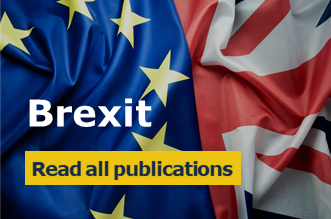The UK and France (like the European Union and other Member States) have started to provide various details on the immediate consequences of a no-deal Brexit, which has become the most likely scenario. If that is the case, the territory of the UK, the companies established there (without being established in a Member State of the European Union) and its residents would become third parties to the European Union for all tax matters as of midnight on 30 March.
Three topics are presented here: you can scroll down the page to read them all or click below to quickly access one of the topics.
VAT: hard Brexit consequences
Regarding all of the economic transactions performed with the UK, the rules to determine the place of taxation, taxation and declaration arrangements, and VAT payments and refunds would, from France’s perspective, be governed by the rules that apply to transactions with a country outside of the EU.
In particular, this means that all the flows of goods between France and the UK would be considered exports/imports for the purpose of VAT. With regard to imports, it should be noted that companies may, under certain conditions, apply for postponed accounting and pay VAT through their periodic VAT return.
With regard to services, based on the nature of the service and the type of client (taxable or non taxable person), it is advisable to ensure today that the place of taxation of the service has not changed in light of the UK’s change of status.
In any event, companies must make sure they review their entire VAT treatment process for transactions conducted with a British client or supplier and also those regarding flows to or from the UK. The information to be provided on their invoices for these transactions may require modification.
With regard to refunds of tax on expenditure incurred by French companies in the UK when said companies are not established in the UK, the electronic system available to companies established in a Member State of the European Union would no longer be accessible as of 29 March 2019. It is highly recommended you proceed, if possible, with a refund application using the electronic system without waiting for this date. Applications filed after 30 March 2019 must be presented to the British tax authorities according to another procedure that may (but still to be confirmed) be similar to the one currently in place in this country for VAT refund to non EU business.
For British companies that are not established in the European Union, a tax representative must be appointed for all of their declaration obligations if they conduct transactions subject to VAT in France. Refund applications for tax charged on expenditure they incur in France although they are not established in France will need to be presented to the tax department for non-residents according to the procedure set out in Articles 242 0 Z quater et seq. of Annex II to the French General Tax Code, and they must, for this purpose, also appoint a tax representative who may be required to present a solvent guarantor.
Taxation of groups of companies
Taxation of intra-group relations and flows will also be impacted. A hard Brexit would call into question certain groups’ ability to benefit from the French tax consolidation regime. In the absence of a specific accompanying measure, the UK’s departure from the European Union would cause the departure of the consolidated group of French subsidiaries held via the intermediary of a company that is a resident of the UK. Thus, in particular, their taxable profits or losses , could no longer be offset against those of the tax-consolidated group. Similarly, Brexit should cause a halt to so-called “horizontal” tax groups composed of the French subsidiaries of a company that resides in the UK. The French Finance Law for 2019 has nevertheless provided terms that allow for deferring the impact of the group’s cessation at the end of the 2019 fiscal year to give the groups in question sufficient time to reorganise without stopping consolidation.
A hard Brexit would also increase taxation on certain distributions.
With regard to inbound dividends, dividends received by certain French parent companies from their British subsidiaries in which their stake is 95% or higher are currently subject to corporate income tax at the standard rate on a 1% share. After Brexit, these dividends will be taxed on a 5% share. However, in a ruling dated March 6, 2019, the French tax administration has admitted that in the event of a hard Brexit, dividend received from UK subsidiaries during the financial year of the Brexit will be deemed as dividend received from an EU company.
With regard to outbound dividends, dividends distributed by French subsidiaries to their British parent companies are currently exempt from withholding tax if at least 10% of the share capital is held for a minimum period of two years, and 5% in certain cases. After Brexit, dividends paid by French subsidiaries of which at least 10% is owned will continue to benefit from a withholding tax exemption, this time pursuant to the tax treaty signed by France and the UK on 19 June 2008. However, the withholding exemption will no longer apply for holdings of 5% to 10% of the capital; the withholding tax rate will be limited to 15%, nevertheless, pursuant to the France-UK tax treaty. For holdings under 5%, the situation will not change, with a withholding tax rate of 15%.
The payment of interest and royalties by a French company to a British one will, however, not be affected by the UK’s exit from the European Union. In fact, the 2003 Interest and Royalties Directive would lapse, but interest is not subject to withholding tax in France and royalties could benefit from a withholding tax exemption in accordance with the France-UK tax treaty.
Regarding restructurings, the “merger” directives of 2005, 2009 and 2017 would also lapse after Brexit, but with no impact as the system of tax neutrality for restructurings also applies to companies whose principal establishment is in a third country that has signed a tax treaty with France and the tax treaty includes a clause on administrative assistance to combat tax avoidance and evasion, which is the case of the France-UK tax treaty. However, the contributions made by French companies to British legal entities will remain subject to the filing of a special declaration to assess the reasons for and consequences of the restructuring, as well as the obligation to attribute to a French permanent establishment of the foreign legal entity the elements contributed.
Furthermore, it will be more complicated for French companies that control British companies who enjoy special tax treatment to invoke a safeguard clause to avoid the application of the anti-abuse measures set out in Article 209 B of the French Tax Code. Indeed, when the subsidiary in question is established in the European Union, these measures only apply if the shareholdings correspond to an artificial scheme intended to evade French tax, while, when the subsidiary is established in a third country, the French legal entity must - to prevent the application of the measures - demonstrate that the principal objective and effect of the subsidiary’s operations are other than to ensure profits are localized in a State or territory where the company is subject to special tax treatment; this condition is considered fulfilled notably when the relevant subsidiary primarily conducts an actual industrial or commercial activity in its State of residence.

Individual taxation: hard Brexit consequences
Individuals wishing to leave France for the UK should not be affected in terms of exit tax. France’s 2019 Finance Act extends the right to automatic deferred payment of tax on unrealised capital gains, without any obligation to provide guarantees, to countries with which France has signed a convention on administrative assistance to combat tax avoidance and evasion and a mutual assistance convention on recovery. This is the case with the UK. This possibility was previously reserved for transfers to EU and (under certain conditions) EEA Member States.
Similarly, as long as the UK fulfils the condition relating to mutual recovery assistance, Article 123 bis of the French Tax Code will no longer apply except in the presence of an artificial scheme.
With regard to individuals who own securities eligible for the PEA (stock savings plans), Ordinance No. 2019-75 of 6 February 2019 provides for a temporary eligibility of the securities from British issuers for the PEA and PEA-SME when said securities were acquired before 30 March 2019. In the event of a no-deal Brexit, the securities acquired as of that date will no longer be eligible for the PEA.
The UK’s departure from the EU will also have a significant impact on social security contributions. As of 1 January 2019, the French Social Security Financing Act for 2019 provides that individuals who are subject to the social security system of another Member State of the EEA or Switzerland are exempt from the social welfare tax (CSG) and the contribution for the reimbursement of social debt (CRDS) for property and investment income and are only subject to the “prélèvement de solidarité” (solidarity levy) at the rate of 7.5%. If the UK does not ratify the general withdrawal agreement, neither these measures nor European Regulation (EC) No. 883/2004 on the coordination of social security systems will apply to the British taxpayers and they will be subject to all of the social security contributions at the rate of 17.2%.
Furthermore, French tax residents receiving securities income paid by a banking institution located in the UK may have to declare the securities income received themselves and pay these levies before the 15th of the month following their receipt.
Your usual advisors are at your disposal to discuss these questions.
Brexit: our lawyers support your business
Thanks to a multidisciplinary, tailored offer, our teams can support your adjustment to a hard Brexit and help you manage the challenges you face vis-à-vis the United Kingdom, against a changing and unstable backdrop.
On the same topic:










Social Media cookies collect information about you sharing information from our website via social media tools, or analytics to understand your browsing between social media tools or our Social Media campaigns and our own websites. We do this to optimise the mix of channels to provide you with our content. Details concerning the tools in use are in our privacy policy.